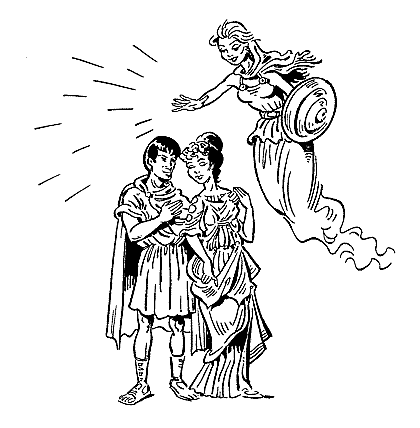Calendar, Junius
(June, the month for marriages, past and present)
Junius, Is of Uncertain Name Origin
June, the Latin form of which is Junius, was formerly the fourth month in the old Roman calendar.
- There are many theories about the origin of the name.
- It is the sixth month in the Gregorian, or New Style, calendar in use today and has 30 days.
- The Roman poet, Ovid, wrote that Junius was derived from juniores, meaning “youths”, for a month, dedicated to the young, just as May, derived from maiores, meaning “elders” was a month dedicated to the older generation.
- In another passage, this same Ovid wrote that Juno claimed that June had been named in her honor. She was the sister and wife of Jupiter, the chief of the gods.
- The Romans regarded Juno primarily as the guardian of all women and protector of their lives in all crucial moments.
- Her special relationship with women is easily seen in the diverse forms under which she was worshiped.
- As Juno Unxia and Pronuba, she played a leading role in furthering and protecting marriages.
- As Juno Caprotina, she was invoked for aid by female slaves.
- As Juno Lucina, she was turned to as a source of strength in time of chilbirth.
- As Juno Sospita, she was called upon as a rescuer in perilous situations.
- Finally, as Juno Regina, the queen of the gods, she was worshiped in conjunction with Jupiter on the Capitoline Hill in Rome.
- One of the most important June festivals in Rome was that of Vesta, the goddess of the hearth, that took place from June 7 to 15.
- It was considered such a sacred occasion that all secular activities were kept to a minimum; even marriages could not be celebrated.
- During the festival, a number of rituals were performed. On the central day of the Vestalia, June 9, three senior vestal virgins prepared a sacred cake of mola (meal), mixing it with salt.
- The mola salsa, or “salt meal”, was offered to Vesta in her temple, the oldest in Rome, said to have been constructed on the Palatine Hill by the legendary King Numa Pompilius in 716 B.C.
- The festival of Vesta finished with the cleansing of the temple storehouse in anticipation of the approaching harvest.
- The storehouse was considered of great importance, since not only Vesta, as goddess of the hearth, but also the Penates, the deities of the household, dwelt there to protect the food supplies of the city.
- In addition to the period of the Vestalia, Roman women believed that June was the most favorable month for marrying.
- The popularity of June as a marriage month has survived through the centuries.

Dost thou love life? Then do not squander time, for that’s the stuff life is made of.
